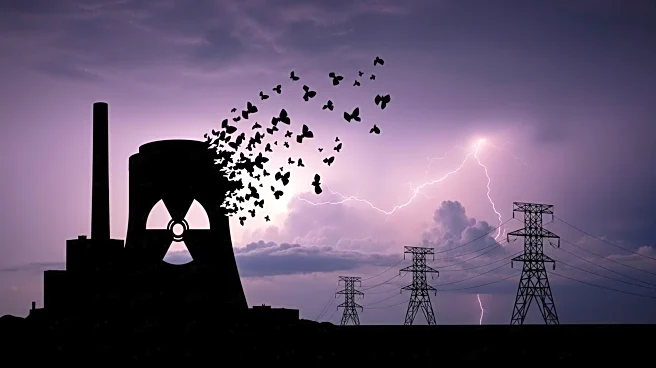What's Happening?
Russia has disconnected the Zaporizhzhia Nuclear Power Plant from Ukraine's power grid, testing its integration into the Russian network. This action has led to a blackout at the plant, which has been ongoing for nearly three weeks. The plant, occupied by Russian forces since March 2022, is Europe's largest nuclear facility and requires electricity to maintain cooling and prevent a nuclear incident. Ukrainian Foreign Minister Andrii Sybiha condemned the move, calling it an attempted theft and a violation of nuclear safety protocols. The International Atomic Energy Agency (IAEA) has reported shelling near the site, heightening concerns about a potential crisis.
Why It's Important?
The disconnection of the Zaporizhzhia plant from Ukraine's grid poses significant risks to nuclear safety, as the facility relies on backup generators to maintain critical functions. This development has sparked international concern, with calls for Russia to halt its actions and allow repairs to the power lines. The situation underscores the geopolitical tensions between Russia and Ukraine, with potential implications for regional stability and nuclear safety. The international community, including the IAEA, is urged to pressure Russia to comply with safety protocols and prevent a nuclear incident.
What's Next?
Ukraine continues to demand the withdrawal of Russian forces from the Zaporizhzhia plant and the establishment of a demilitarized zone around the facility. However, Russia has repeatedly rejected these proposals. The ongoing blackout and reliance on backup generators increase the risk of a nuclear incident, prompting calls for urgent international intervention. The situation remains tense, with potential diplomatic efforts needed to resolve the crisis and ensure the safety of the nuclear facility.
Beyond the Headlines
The disconnection of the Zaporizhzhia plant highlights the broader implications of military occupation on critical infrastructure and nuclear safety. The situation raises ethical and legal questions about the use of nuclear facilities as leverage in geopolitical conflicts. Long-term, this development could influence international nuclear safety standards and protocols, as well as diplomatic relations between Russia, Ukraine, and other global powers.








